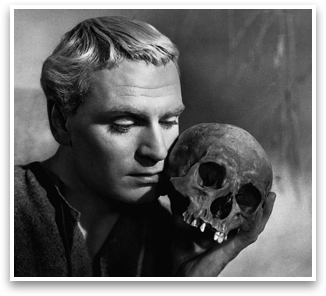
Hamlet
"To be or not to be"; "to thine own self be true"; "frailty, thy name is woman" - apart from the Bible, there is no more quoted work in the western literary tradition than Shakespeare's Hamlet. The role of Hamlet himself has long been considered a coveted role amongst stage actors because of the wide range of human emotions that Hamlet covers in such a relatively brief time.
Along with King Lear and Macbeth, Hamlet is considered Shakespeare's greatest achievement. Though the phrase become trite and must be used with caution, Hamlet is perhaps the most existential of all Shakespeare's works, forcing the reader to grapple with questions of mortality, divine providence, and justice.

Themes and Facts
- The dichotomy "appearance vs. reality" - often what appears to be the case is illusory.
- The uncertainty of life, an ironic theme given the uncertainty in interpreting the play itself.
- The reality and even desire for death in a world of pain and suffering (e. g. Hamlet's famous "to be or not to be" speech).
- The pervasive effect of political corruption upon the state (i.e. Cladius's murder of King Hamlet).
Study Questions
- The question for Hamlet is the following - is Hamlet mad? To be more precise, is he sane, pretending to be mad; mad, pretending to be made; or sane, pretending to be mad but eventually becoming made?
- What do you make of Gertrude? Is she a sympathetic figure or not?
- Why is Hamlet so cruel to Ophelia?
- Hamlet is often accused of being unable to act. Is this a fair assessment?
The western literary tradition has no greater achievement than Shakespeare's Hamlet. As the preeminent poet of the human condition, Shakespeare provides us with a timeless example of the art of tragic drama.